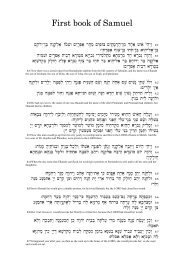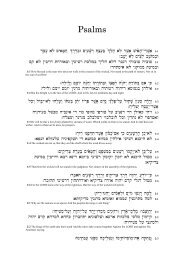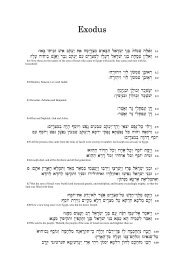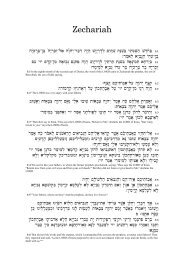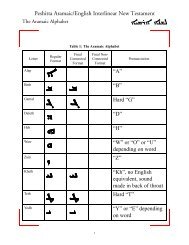Split Words - Peshitta Aramaic/English Interlinear New Testament
Split Words - Peshitta Aramaic/English Interlinear New Testament
Split Words - Peshitta Aramaic/English Interlinear New Testament
Create successful ePaper yourself
Turn your PDF publications into a flip-book with our unique Google optimized e-Paper software.
Let’s see now the <strong>Peshitta</strong> Text:<br />
...tyl4 f tl9d Nm 0h Nyd 0dh<br />
It’s all about the verb l9 (to enter). Notice that both FIRST (common) and THIRD FEMENINE (and also 2nd<br />
Masculine, but it isn’t relevant here) persons of the singular Perfect Peal, tl9 , WITHOUT VOWELS ARE THE<br />
SAME!<br />
So, in this case:<br />
tle9 (‘alth) = You (m) entered<br />
telO9 (‘elath) = She entered<br />
tOlO9 (‘eleth) = I entered<br />
Therefore, this could confuse Zorba, poor fellow. ANOTHER PROVE OF THE ARAMAIC PRIORITY!” –<br />
Valentin Sanz Gonzalez<br />
The Greek manuscript containing the rare “she” reading, is manuscript B (Beza 1598).<br />
Now this verse contains an important split word, that exposes a contradiction among the Greek manuscripts, and<br />
demonstrates how the Greek manuscripts involved are derived from the <strong>Aramaic</strong> original. It gets better! A few<br />
verses earlier, we see a beautiful ‘word play’. Who said that our LORD was not a poet?<br />
“There is a word play here, too. Did you catch it?<br />
Luke 7:41-42<br />
0bwx 0rm dxl wwh ty0 0byx Nyrt<br />
There were two debtors to a certain creditor<br />
00m4mx 0rnyd 0wh Byx dx<br />
One owed him 500 dinarii<br />
Ny4mx 0rnyd 0nrx0w<br />
And the other, 50 dinarii<br />
Qb4 Jwhyrtl (rpml Jwhl 0wh tyldw<br />
And because they had nothing with which to repay, he forgave them both<br />
Yhwybxn ryty Jwhnm Lykh 0ny0<br />
Which of them, therefore, will love (hint: owe) him most?



